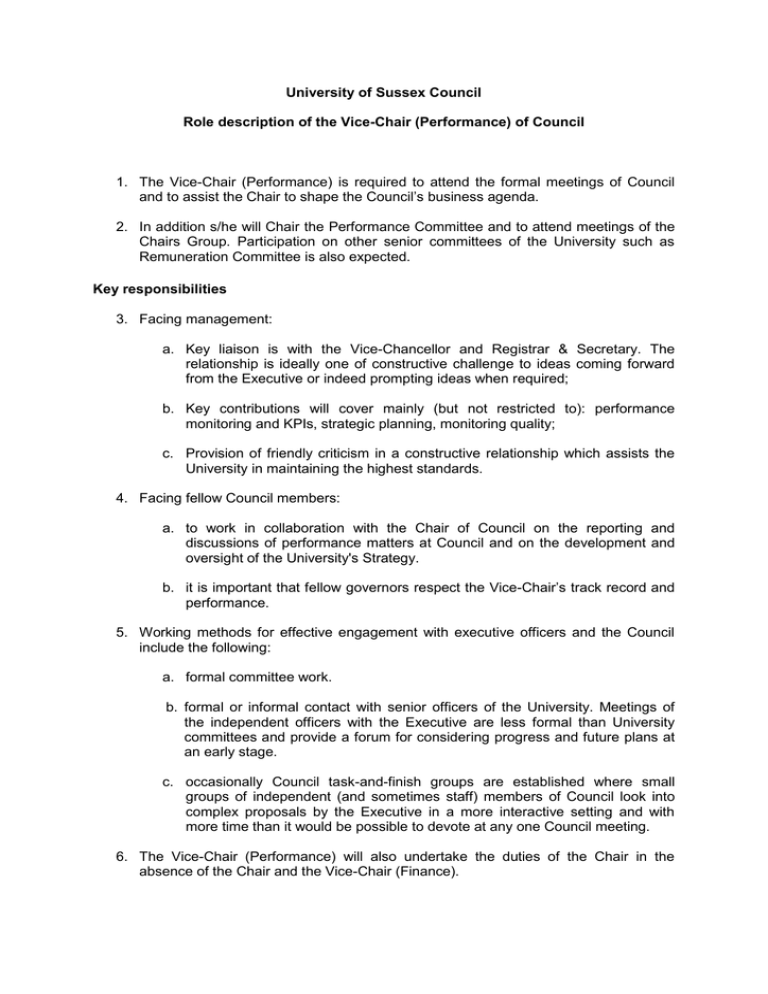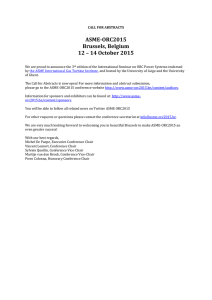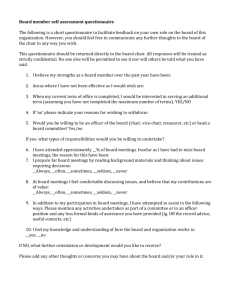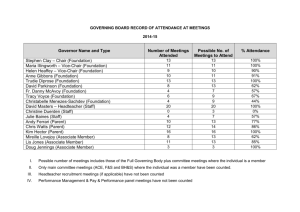University of Sussex Council
advertisement

University of Sussex Council Role description of the Vice-Chair (Performance) of Council 1. The Vice-Chair (Performance) is required to attend the formal meetings of Council and to assist the Chair to shape the Council’s business agenda. 2. In addition s/he will Chair the Performance Committee and to attend meetings of the Chairs Group. Participation on other senior committees of the University such as Remuneration Committee is also expected. Key responsibilities 3. Facing management: a. Key liaison is with the Vice-Chancellor and Registrar & Secretary. The relationship is ideally one of constructive challenge to ideas coming forward from the Executive or indeed prompting ideas when required; b. Key contributions will cover mainly (but not restricted to): performance monitoring and KPIs, strategic planning, monitoring quality; c. Provision of friendly criticism in a constructive relationship which assists the University in maintaining the highest standards. 4. Facing fellow Council members: a. to work in collaboration with the Chair of Council on the reporting and discussions of performance matters at Council and on the development and oversight of the University's Strategy. b. it is important that fellow governors respect the Vice-Chair’s track record and performance. 5. Working methods for effective engagement with executive officers and the Council include the following: a. formal committee work. b. formal or informal contact with senior officers of the University. Meetings of the independent officers with the Executive are less formal than University committees and provide a forum for considering progress and future plans at an early stage. c. occasionally Council task-and-finish groups are established where small groups of independent (and sometimes staff) members of Council look into complex proposals by the Executive in a more interactive setting and with more time than it would be possible to devote at any one Council meeting. 6. The Vice-Chair (Performance) will also undertake the duties of the Chair in the absence of the Chair and the Vice-Chair (Finance). 2 7 Person specification The Vice-Chair (Performance) will command personal and professional respect, have personal integrity and be willing to devote the necessary time to participate fully in the work of the University. The Vice-Chair will have a strong personal commitment to the values, aims and objectives of the University. Knowledge and experience professional expertise and knowledge in matters relevant to the successful operation of a large, diverse organisation, e.g. commercial acumen, risk management, performance management; experience of chairing meetings and bringing matters to a satisfactory conclusion; awareness of the regulatory environment, so that legitimate scrutiny and accountability are respected and effectively discharged. Personal attributes The Vice-Chair should have: excellent interpersonal and communication skills, including the ability to establish good working relationships, the ability to listen as well as express personal views and to influence and interact with all members of Council including independent members, students, and academic and professional services staff; diplomacy and sensitivity; demonstrable authority; the ability to deal with conflict in a constructive manner; skills of networking, influencing and advocacy; political awareness; the ability to represent the University to a range of stakeholders including ministers, civil servants, students, staff, the local community and potential funders and donors; the ability to absorb large quantities of complex information quickly; collaborative skills and the ability to work as a member of a team; an interest in the education and welfare of students and a desire to help them to thrive and succeed. General information 8 Term of Office: three years (renewable). The maximum term as a member of Council is nine years. 9 Time Commitment: this is estimated to average 2 to 2.5 full time equivalent days per month. Council meets four times a year, generally with a one day strategic meeting in late September, a business meeting in late November, a two day meeting (comprising a one day stragetic meeting and a one day business meeting) in late March/early April and a business meeting in early July. Performance Committee meets termly for about half a day. However, the University needs to be able to contact the Vice-Chair at all times. The role may include both daytime and evening engagements; 3 10 Remuneration: the role is not remunerated but reasonable travel, subsistence and ancillary expenses will be reimbursed. Method of appointment 11 Under the provisions of the University Statutes, the Vice-Chair (Performance) is elected by Council from amongst its independent members. The Nominations Committee of Council will make a recommendation to Council following consultation with members of Council. AP November 2011

![Council role description - Vice Chair (Finance) [DOC 62.00KB]](http://s2.studylib.net/store/data/014983293_1-a0732265bc2b3099e100d42b3b951892-300x300.png)

